- Home
- Jana Oliver
Madman's Dance (Time Rovers) Page 21
Madman's Dance (Time Rovers) Read online
Page 21
“I thought that Metropolitan police regulations required their policemen be at least five feet nine,” Wescomb said, feeding him the objection.
“In that regard, Sergeant Keats is a notable exception. I am quoting his height directly from police records. I also verified it this morning in the presence of the prison warder.”
There was murmuring as Wescomb’s assistant came forward. Alastair handed him the sash and Kingsbury positioned it on Mrs. Butler’s neck.
“You will note,” Alastair remarked, pointing to the tableau, “that the angle of the sash is nearly parallel.” He gave a nod and Kingsbury lightly tightened the fabric. Through it all, Mrs. Butler maintained a neutral expression as Alastair had instructed her, hands at her sides. He was quite proud of her performance.
The doctor gestured. The assistant removed the sash and handed it to him. “The ligature marks found on Miss Hallcox’s neck were not parallel, as would be expected of a man of Sergeant Keats’ stature,” he explained, stepping up behind Mrs. Butler. Repositioning the sash, he tightened it carefully. “During the post-mortem, we noted that the ligature marks on the back of her neck were not level, but rose, corresponding to someone approximately five feet nine, as I am.”
“Could not Sergeant Keats have pulled upward on the sash?”
“Not with his broken rib, my lord.”
“What about standing on a chair or a stool? That would change the angle of the ligature mark.”
“I doubt the victim would have allowed the murderer time to prepare in such a fashion. Besides, Sergeant Keats’ rib injury would have precluded such an athletic feat.”
“Indeed. Your conclusion, Doctor?” Wescomb prompted.
“The marks on the deceased were made by an assailant taller than the accused.”
“Thank you for this most informative demonstration,” Wescomb said.
Realizing he was staring at the sash, Keats forced his eyes away. One thing was clear: no matter what happened to him, Alastair’s forensic career was launched as solidly as a new ship puts to sea.
“I wish to cross-examine, my lord,” Arnett said, rising to his feet. “Your demonstration, as my learned colleague calls it, has been most unusual. From your testimony you would have us believe that the prisoner is incapable of murder.”
“I did not say he was incapable of murder, sir. I said that the evidence indicates he did not commit this murder,” Alastair replied.
Wescomb beamed his approval.
“I see,” Arnett replied. “Now if I had a close friend staring at the noose, I wonder if I might be so inclined as to, well, obfuscate the evidence.” A dramatic pause. “Do you wish to recant your testimony, Doctor?” he asked silkily.
“No. The physical evidence stands. Sergeant Keats, by virtue of his height, could not have strangled Nicola Hallcox.”
“So you say. I have no more questions, my lord.”
Wescomb rose. “Dr. Montrose, did you have your findings validated by another impartial professional?”
“Yes. The forensic experts at St. Mary’s Hospital reviewed our findings and drew the same conclusion.”
“Thank you. That is all.”
~••~••~••~
“Damn the man!” Alastair slammed his fist on the table, causing all eyes in the Viaduct Tavern to swing toward him. Reuben retrieved his ale to keep it out of harm’s way.
Wescomb shook his head. “I did warn you that Arnett would pull all the tricks out of his bag.”
Alastair looked over at his mentor. “In future, Reuben, I think it best I not assist you. My professional opinion will always be in doubt because of that one event in Wales. I shouldn’t have wasted your time.”
Reuben chuffed. “On the contrary, you’ve not wasted it. You’re the one who found that discrepancy with the ligature mark. I didn’t see that.”
“Still—”
“Fancy place, isn’t it?” Reuben asked, pointedly changing the subject. His eyes roved upward. “I particularly like the painting of the three maidens.”
Realizing he would get no further on the topic, Alastair finally took note of their surroundings. The painting Reuben mentioned adorned one whole wall. Above it was a red-tiled ceiling supported by sturdy, cast iron pillars. As he looked around, he noted a man near the bar, watching them. The moment their eyes met, the fellow turned away.
“It’s built on top of old Newgate Prison,” Wescomb explained. “The cellar still holds some of the cells.” He stroked his gray moustache in thought. “On the whole, I think we’ve done rather well so far. We’ve shown the inspector has run a slipshod investigation, that there are a number of other gents who might feel the need to put Miss Hallcox in her grave, and proved that the sergeant is just too short to have done the deed.” He nodded, pleased. “We have firmly inserted an element of doubt in the minds of the jury.”
“Lord Wescomb?” a voice asked.
They looked up at the newcomer. He was dressed like most of the other patrons: suit and bowler. The defining difference was the pen and notebook in his hand. Alastair slipped a quick glance toward the bar. Their watcher was still there.
“Yes, sir?” Wescomb asked.
The man stepped forward to join them. “I’m Robert Anderson, reporter for the Chicago Herald.”
“You’re far afield, sir,” his lordship replied politely.
“So I am reminded each day.”
“Ah, that’s where I’ve heard the name. You were with the inspector the night Sergeant Keats was arrested.”
“Yes. Quite an adventure. I’ve been attending the trial and have a few questions to put to you, if you agree.”
“Such as?” Wescomb asked, going on guard.
“It appears that certain topics are off limits at the proceedings. Why is that?”
Wescomb’s expression grew even more guarded. “That is a question you must put to Home Office. I am not at liberty to answer.”
“Home Office,” the fellow repeated, making a note. “I have heard that there are still explosives at large in London.”
“Rumors come and go like the fog in this city.”
“Every now and then, rumors prove true.”
Wescomb eyed him. “It depends.”
“If you could make a plea to the public on behalf of your client, what would it be?” Anderson asked.
This was a question Wescomb could answer without restraint.
“My fervent request is that if someone saw the sergeant that night in Whitechapel, they must come forward. An innocent man’s life hangs in the balance.”
The reporter tucked away his notebook and pen. “Thank you, Lord Wescomb. I appreciate your time.” He inclined his head and set off for the door.
The peer let out a sigh of relief. “Reporters always make me nervous. You never know what they’ll write. Especially one from America.” He looked over at his companions. “You’re both welcome to come to my home for the evening. We’ll take supper and you can help me work on my closing arguments.”
“I regret I shall have to pass, Sagamor,” Reuben replied. “I am leaving for Dublin on Saturday to consult on a case. There is much that must be done before then.”
“How about you, Alastair?”
“Thank you, my lord. I would be happy to accompany you. I’d rather be doing something useful for a change.”
“Excellent.” Wescomb rose from his chair. “Come on. My carriage should arrive in a few minutes.”
Chapter 22
“His lordship is here, Mr. Brown,” the maid called out, watching the street from the front window.
“Thank you, Marie,” he replied. She hurried past him, her task complete. The butler heard the swish of skirts on the stairs as Lady Sephora descended to meet her husband, as she did most evenings.
“Has Kingsbury arrived yet?”
“No, milady. He sent word that he was delayed and would be here closer to nine.”
“A long night indeed,” she replied.
Howard Brown adjuste
d his coat and then opened the front door, stepping outside. He scanned the streets as the coach came to a halt. It was after dark and a silvery mist hung in the air.
Wescomb waved as he exited the carriage. “Good evening, Brown!”
“Good evening, your lordship,” the butler called out.
“A bit damp, isn’t it?”
“Yes, my lord. It looks like rain.”
“He’s in high spirits,” Lady Sephora observed. “That bodes well. Perhaps I should have attended court today.”
Another man stepped out of the carriage. After a word from Wescomb, he headed for the front door.
“Dr. Montrose,” Lady Sephora acknowledged with a smile. “Welcome.”
“Good evening, your ladyship,” he responded, mounting the stairs to the house. He looked drawn, dark circles under his eyes.
“Go on in,” her ladyship told him. “Have a seat in his lordship’s study. I’ll ask Marie to bring you some tea to cut the chill.”
“Thank you, my lady.”
Wescomb approached, smiling widely. “Good evening, my dear,” he called out, doffing his hat in a gallant gesture at the bottom of the stairs. “Today went well. I believe we may just prevail in this—”
There was the hurried sound of footsteps on the sidewalk.
“My lord!” Brown shouted.
The first shot spun Wescomb around like a top. The second missed, shattering a gas lamp farther down the row of houses. His lordship fell to one knee, his face a sketch of pain and surprise. The gunman boldly advanced on him, cocking the pistol, aiming at his forehead for the final coup de grace.
Three shots echoed in the street like cannon blasts. Brown’s first bullet missed, the second hit its mark, followed by the third. The assassin staggered toward the center of the street, clutching his chest as blood poured down the front of him. A hansom sped toward him, and for a second Brown thought it would strike him down. Instead, hands pulled the injured man inside. The driver whipped the horse unmercifully, sending sparks from the beast’s hooves as it flew away.
Sephora was the first to her husband. “John!”
Lord Wescomb gaped at her. “Hell of a thing, Sephora…”
Then he toppled over.
Alastair had just settled in a chair when he heard the shots. Bolting down the hallway and onto the street, he found his host cradled in his wife’s arms, white shirt thick with blood.
“We need to get him inside as quickly as possible,” Alastair insisted.
“Foster!” Brown called, beckoning to a young footman standing at the top of the stairs. “Help me with his lordship.”
Once the peer was laid on his own bed, Alastair moved forward.
“Staunch the bleeding as best you can,” he ordered as Lady Sephora leaned over her husband, her face alabaster and hands painted in blood. She pressed a cloth into Wescomb’s right shoulder, instantly staining it dark crimson.
Alastair stripped off his coat, tossing it aside with no care as to where it landed. “I’ll need hot water, bandages, any antiseptic you have,” he ordered.
The maid bobbed once and flew out of the room.
Alastair pulled a chair near the bed. “Let me have a look,” he said, taking Lady Sephora’s place. He pulled back the compress and gently examined the wound, taking care not to touch the injury directly.
Wescomb looked up at him with a sweat-sheened face. “Oh, there you are…young man. How bad is it?”
“Just determining that.” Alastair carefully manipulated the peer’s arm, eliciting a groan. “Sorry, my lord.” His initial examination complete, he gently replaced the compress. “It is as I hoped.”
“As you hoped?” Sephora asked, hanging on his every word.
“The bullet has gone completely through the fleshy part of his shoulder. Just continue pressing on the wound while I wash up.”
He rolled up his cuffs, poured water into the basin, and scrubbed furiously with a bar of soap that smelled of pine trees. The panicked maid scurried in with a basin of hot water, some of it sloshing over the edge onto the carpet.
“Excellent. Place it near the bed.”
The girl wavered on her feet, but did as he asked, full attention on her master. “The bandages are coming, sir.”
“Thank you.” Alastair dried his hands. “Please bring some hot tea with a tot of brandy in it for your mistress.”
“Yes, sir,” the maid said, curtseying. The door closed behind her and he heard the sound of running footsteps on the stairs.
Alastair sat next to the wounded man. “Do you feel well enough to assist me, your ladyship?”
Sephora nodded weakly. “I do.”
“Your lordship, this is not going to be comfortable,” Alastair advised.
“You all say that sort of thing.” He eyed his wife, panting and gritting his teeth as Alastair set about cleaning the wound. A deep breath. “How did our…butler,” Wescomb asked in between hisses of pain, “come to…have a pistol…in his pocket, my dear?”
There was a noticeable pause before Sephora found her voice. “Brown is a gamekeeper’s son. He is familiar with firearms. I thought it prudent that he be armed, given the extraordinary pressure you’ve faced during Keats’ trial.”
Wescomb mustered a weak smile. “You’re a marvel, my dear.”
Sephora’s eyes moistened.
His lordship winced again. “Take my advice, Doctor. Marry a smart woman. If I had done otherwise, I would be dead.”
“I shall remember that, my lord,” Alastair responded with a smile. “There, the bleeding has slowed. A very positive sign.”
The maid hurried in with the tea tray. In her wake, the butler appeared at the door with a tray of bandages.
“Perfect,” Alastair replied. “Thank you.”
“My lord,” Brown began, “I have secured the house. I have an armed footman on each entrance and have sent for the police. I fear we’ll be thick with Blue Bottles very soon.”
“No doubt contributing to the chaos,” Wescomb muttered. “Excellent, Brown. When I’m well again, we’ll go shooting. I haven’t done that in ages. It appears to be a skill I must endeavor to polish if others intend to make me a target in future.”
The man was visibly startled. “I…I would be honored, my lord.”
The moment the butler was out of the room, Wescomb added, “Raise his salary, will you Sephora? Can’t lose that man to one of our neighbors.”
“Most certainly, John.”
“If you can hold his lordship’s arm steady, I’ll apply the antiseptic and then the bandages,” Alastair requested.
She clasped hands with her husband and placed a kiss on his damp forehead. Another grunt of pain issued from the injured man, and she winced in sympathy.
“You are going to win this case, John, or they would not have gone to such effort.”
Wescomb nodded. “The question is, dare I ask for a continuance? The jury is teetering on the brink. Give them a week and they may swing in favor of the prosecution.”
Alastair expertly tied off the bandage. “There, we’re done. If you have laudanum in the house, I would recommend a dose to cut the pain.”
“Not yet. Not until Kingsbury arrives. We must make war plans.”
“You’ve got a hole in your shoulder,” Alastair retorted.
“It’s better than a noose around the neck. No arguments; we’ll do our work, and then I’ll rest.”
Sephora abruptly rose and made her way to the chair near the fireplace, her face still ashen. When Alastair next looked at her, large tears glistened on her cheeks. She gave him a wan smile, her hands clutching a teacup.
“Sephora?” Wescomb murmured from deep in the bedcovers.
Suddenly, she was all attention. “Yes, John?”
“Dr. Montrose has not had anything to eat this evening. Can you ensure he receives a good meal?”
“Of course, dear.”
“It appears that Kingsbury is about to earn his spurs,” Wescomb observed.
“Is he up to the task?” Alastair asked.
The peer caught the doctor’s eyes. “He’ll just have to be, won’t he?”
~••~••~••~
2057 A.D.
TEM Enterprises
Morrisey rubbed his temples to ease the headache. It wasn’t working. In front of him, on the vid-monitor, was Dr. Weber waxing verbose about the dangers of untreated ARD. The aggrieved psychiatrist was making the rounds of Vid-Net talk shows. His message was simple: if his patient had been treated when she was younger, the incident would never have happened.
Fulham and Mr. Hamilton were watching over his shoulder. He could feel the mounting tension, at least from Jacynda’s oldest friend.
“That bastard,” Hamilton muttered under his breath “He should lose his license.”
“He hasn’t crossed the line yet,” Fulham advised. “As long as he only uses her initials and not her name, he’s fine.”
“Everybody will know it’s her,” Hamilton protested. “There are only seven or so women currently active in the time stream. You’d have to be stupid not to connect the dots.”
Weber’s voice rose from the speaker. “Untreated Adrenalin Reactives are a sincere danger to themselves and to society. I have learned this personally and am submitting a request for legislation to make treatment mandatory.” He touched his bruised jaw gingerly for emphasis.
Morrisey ground his teeth. The moment the interviewer invited listeners to send in their thoughts, the Vid-Net message boards went ballistic. Hamilton groaned, bringing up a second screen to scan them.
“What are they saying?” Morrisey asked. It would be easier to craft a response if he knew what the public thought of all this.
“Most of them are from the time groupies. Leave it to the Timers to spread a juicy rumor,” Hamilton grumbled. “One of them says Lassiter’s too far into Endorphin Rebound and went rogue. Another writes that she tried to kill Defoe.” He chuckled darkly. “This one says she tried to kill you, boss.”

 Mind Games
Mind Games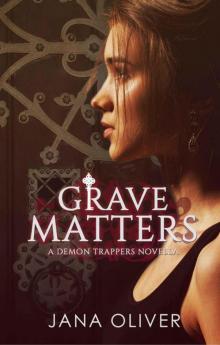 Grave Matters
Grave Matters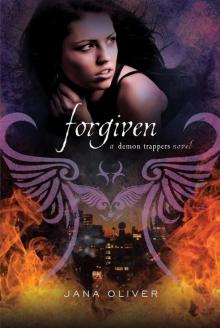 The Demon Trappers 3: Forgiven
The Demon Trappers 3: Forgiven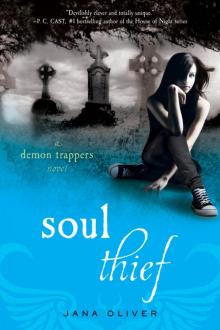 Forbidden
Forbidden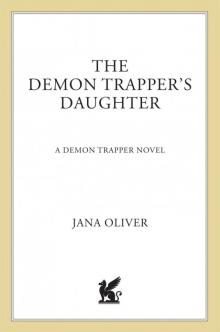 Forsaken
Forsaken Briar Rose
Briar Rose The Demon Trappers: Foretold
The Demon Trappers: Foretold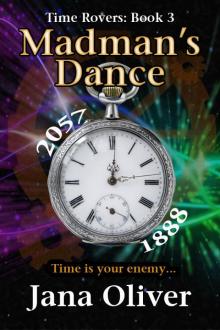 Madman's Dance (Time Rovers)
Madman's Dance (Time Rovers)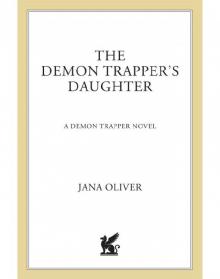 The Demon Trapper’s Daughter
The Demon Trapper’s Daughter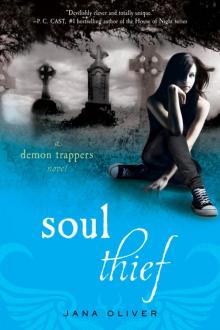 Soul Thief-Demon Trappers 2
Soul Thief-Demon Trappers 2 Mind Games (Demon Trappers Book 5)
Mind Games (Demon Trappers Book 5) The Demon Trappers: Forgiven
The Demon Trappers: Forgiven